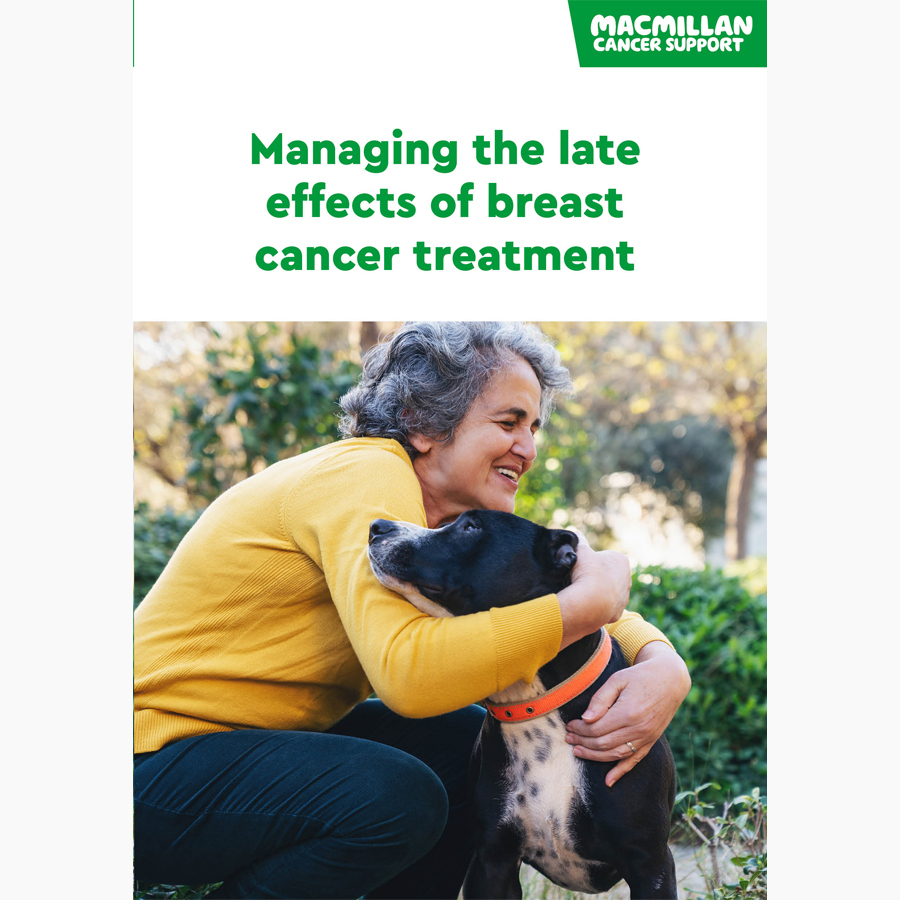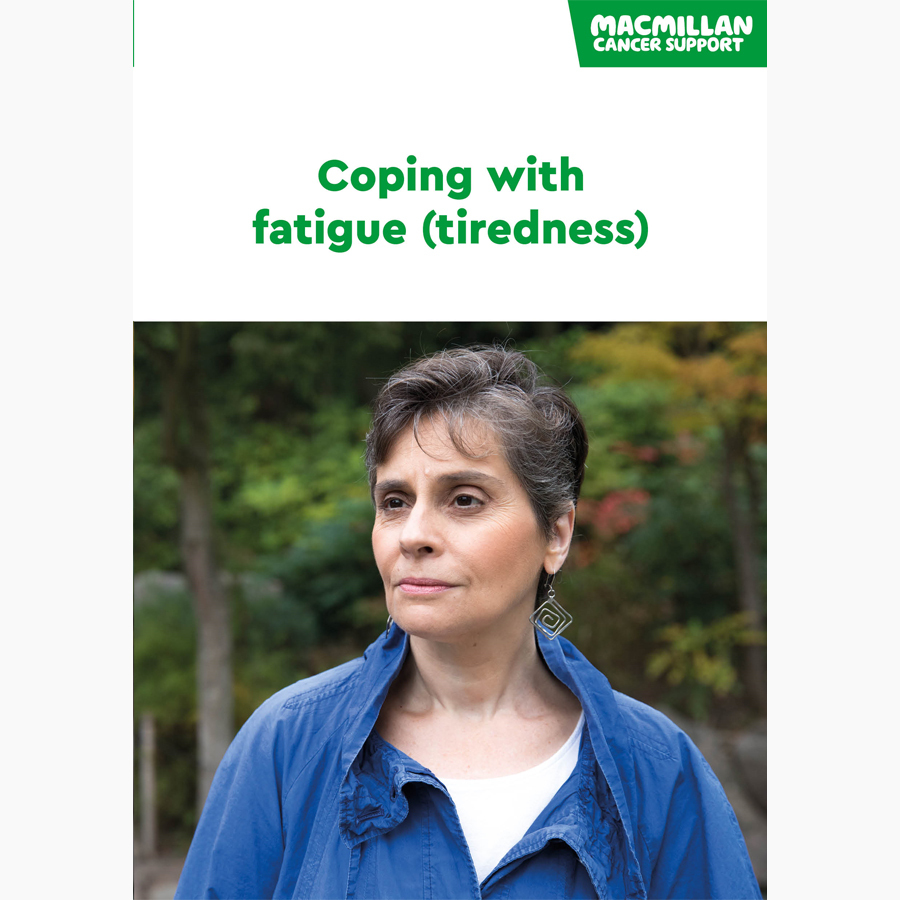Late effects of breast cancer treatment
Most people have side effects during treatment for breast cancer and after treatment ends. Usually, these get better slowly and then stop. Sometimes side effects do not go away, or they can develop months or years after treatment. These are called late effects.
On this page
-
What are long-term and late effects?
-
Talking to your doctor
-
Breast and arm changes
-
Tiredness and fatigue
-
Peripheral neuropathy
-
Weight gain
-
Menopause and menopausal symptoms
-
Effects on sex and fertility
-
Effects on the bones and joints
-
Effects on the heart and lungs
-
Concentration and memory problems
-
About our information
-
How we can help
What are long-term and late effects?
Most people have side effects during treatment for breast cancer and for a few weeks after treatment ends. Usually, these side effects get better slowly and then stop. But sometimes side effects do not go away. Or they can develop months or years after treatment.
There are 2 commonly used terms for these side effects:
- long-term effects – if they begin during treatment or shortly after treatment has ended, and last for months
- late effects – if they begin months or even years after treatment.
In this information, we use the term late effects to include both long-term and late effects of treatment.
Late effects may be minor and not affect your daily life much. Or they may be more difficult to live with and affect your daily life more.
There are many things that can be done to help manage or treat late effects. It is important that you get support to help you cope with them and live life as well as you can. Some late effects improve over time and may eventually go away on their own.
We have more information about coping with breast cancer.
Booklets and resources
Talking to your doctor
Always tell your cancer doctor or specialist nurse if any side effects do not go away after treatment, or if you develop late effects.
Give them as much information as you can about your side effects. The more they know, the better they can help you. You may feel embarrassed talking about some effects, such as urinary problems or difficulties with your sex life. But doctors and nurses are used to talking about these things.
Some late effects may be similar to the symptoms you had when you were first diagnosed. This can be scary, and you may worry the cancer has come back.
The breast care team will assess your symptoms. They will explain whether the symptoms could be caused by treatment. They will talk to you about what can be done to manage late effects. They may also refer you to a doctor who specialises in the late effects of treatment.
Sometimes symptoms are caused by other conditions not related to the cancer or its treatment. Your doctor may arrange tests to find out more about what is causing your symptoms.
Remember that you can contact your specialist nurse at any time if you have any concerns. You can also contact your GP.
You may need support from your family, friends or you can talk to one of our cancer support specialists for free on 0808 808 00 00.
Related pages
Breast and arm changes
Surgery and radiotherapy to the breast can cause a number of changes. These can include:
- changes to the appearance of the breast
- pain and changes in sensation
- problems with movement or strength
- cording (cord-like structures under the skin on the inner arm)
- swelling of the arm, hand or breast (lymphoedema), if the armpit is treated.
Tiredness and fatigue
Tiredness is probably the most common side effect of breast cancer treatment. It may start during treatment, or after treatment has ended.
It is common for tiredness to last for months after treatment. For some people, it may last much longer.
Booklets and resources
Peripheral neuropathy
Peripheral neuropathy (also called neuropathy) is damage to nerves that carry messages between the brain, the spinal cord and the rest of the body. Nerve damage can cause symptoms such as pins and needles, numbness or pain in the hands and feet. For some people, this may lead to problems with balance and walking.
Treatment with the chemotherapy drugs docetaxel or paclitaxel is the most common cause of peripheral neuropathy in breast cancer. Some types of targeted therapy can also cause peripheral neuropathy. Surgery and radiotherapy to the breast may also cause nerve damage on the treated side.
After treatment has stopped, these symptoms usually get better as the nerves recover. This usually takes several months. But sometimes the nerves do not completely recover, and some nerve damage is long term. The symptoms may still get better over time.
We have more information about peripheral neuropathy.
Weight gain
After breast cancer treatment, you may find you have gained weight. This can happen because:
- chemotherapy or another treatment has caused an early menopause
- you took steroids during chemotherapy
- you are having hormonal therapy
- you may have been less active and less able to eat a healthy diet during treatment.
Losing weight can be difficult. And keeping to a healthy weight can also be hard. But there are lots of benefits.
Keeping to a healthy weight reduces the risk of getting heart problems and other illnesses, such as diabetes. There is evidence that staying a healthy weight after the menopause helps reduce the risk of breast cancer coming back.
We have more information about managing weight gain after cancer treatment.
Menopause and menopausal symptoms
Some breast cancer treatments can affect the way the ovaries work. This can cause an early menopause for some women, which may be temporary or permanent.
It can also cause side effects similar to menopausal symptoms. Sometimes these effects do not last long.
We have more information about managing menopausal symptoms.
Effects on sex and fertility
Sexual well-being and body image
Breast cancer and its treatment can affect your sex life and your body image. Body image is how you think and feel about your body.
Problems can happen as a result of the physical and emotional effects of cancer and its treatment. Things like feeling tired, pain and menopausal symptoms may affect your sex life.
You may have a lower sex drive (low libido) or be adjusting to a change in how your body looks or feels. You may worry how this will affect your sex life or relationships. For some people, these problems continue after treatment has finished.
We have more information about cancer and your sex life.
Fertility
Some breast cancer treatments can affect your ability to get pregnant. This is called your fertility.
Before starting any cancer treatment, talk to your cancer doctor or specialist nurse if fertility is important to you or may be important to you in the future.
Fertility problems will not affect everyone. They may be temporary, but for some people they will be permanent. Before you have treatment, your cancer doctor or specialist nurse can explain your risk of having fertility problems after treatment.
We have more information about how cancer treatment can affect fertility.
Effects on the bones and joints
Bone thinning
After breast cancer treatment, you may be at a greater risk of bone thinning. This is called osteoporosis. It happens because some treatments can reduce the amount of oestrogen in the body. Oestrogen helps to keep bones healthy and strong.
Treatments for breast cancer that can increase the risk of osteoporosis are:
- chemotherapy, especially if it causes an early menopause
- hormonal therapy with aromatase inhibitors (AI) such as anastrozole, exemestane or letrozole
- drugs called LHRH analogues, such as goserelin (Zoladex®) and leuprorelin
- ovarian ablation (surgery to remove the ovaries).
Rarely, radiotherapy weakens the bones in the treated area. For example, it may weaken the ribs and collarbone.
Most people are usually offered drugs called bisphosphonates. These help to reduce the risk of breast cancer coming back and help to strengthen the bones. If you have bone thinning you may also be offered supplements to help.
We have more information about bone health.
Pain in the joints and muscles (arthralgia)
If you are taking aromatase inhibitors you may have joint pain and sometimes muscle pain. Joint pain is also a common symptom of the menopause.
We have more information about managing joint and muscle pain.
Effects on the heart and lungs
Some treatments for breast cancer may increase the risk of developing heart and lung problems. Usually, these problems occur many years after treatment ends. Most people will never experience any effects. But it may help to understand more about how you can take care of your health.
Concentration and memory problems
After treatment for breast cancer, you may have difficulties concentrating and remembering things. Doctors call this cognitive impairment.
It is also sometimes called chemo brain or chemo fog. But these changes can also happen with other cancer treatments, such as hormonal therapy.
An early menopause may result in similar symptoms, or make them worse.
About our information
-
References
Below is a sample of the sources used in our late effects of breast cancer information. If you would like more information about the sources we use, please contact us at cancerinformationteam@macmillan.org.uk
Curigliano et al 2020. Management of cardiac disease in cancer patients throughout oncological treatment: ESMO consensus recommendations. Annals of Oncology. Vol 31 (2). Available from: www.annalsofoncology.org/article/S0923-7534(19)36080-6/pdf [accessed November 2021].
Fabi et al 2020. Cancer-related fatigue: ESMO Clinical Practice Guidelines for diagnosis and treatment. Annals of Oncology. Available from: www.annalsofoncology.org/article/S0923-7534(20)36077-4/pdf [accessed November 2021].
National Institute for Health and Care Excellence (NICE). Early and locally advanced breast cancer: diagnosis and management. NG101. Available from: www.nice.org.uk/guidance/ng101 [accessed November 2021].
-
Reviewers
This information has been written, revised and edited by Macmillan Cancer Support’s Cancer Information Development team. It has been reviewed by expert medical and health professionals and people living with cancer. It has been approved by Dr Rebecca Roylance, Consultant Medical Oncologist and Professor Mike Dixon, Professor of Surgery and Consultant Breast Surgeon.
Our cancer information has been awarded the PIF TICK. Created by the Patient Information Forum, this quality mark shows we meet PIF’s 10 criteria for trustworthy health information.
The language we use
We want everyone affected by cancer to feel our information is written for them.
We want our information to be as clear as possible. To do this, we try to:
- use plain English
- explain medical words
- use short sentences
- use illustrations to explain text
- structure the information clearly
- make sure important points are clear.
We use gender-inclusive language and talk to our readers as ‘you’ so that everyone feels included. Where clinically necessary we use the terms ‘men’ and ‘women’ or ‘male’ and ‘female’. For example, we do so when talking about parts of the body or mentioning statistics or research about who is affected.
You can read more about how we produce our information here.
Date reviewed

Our cancer information meets the PIF TICK quality mark.
This means it is easy to use, up-to-date and based on the latest evidence. Learn more about how we produce our information.





